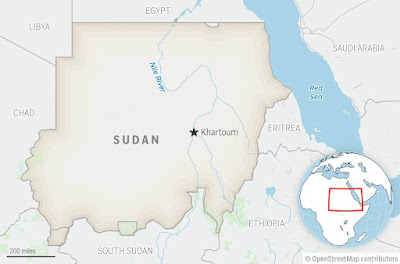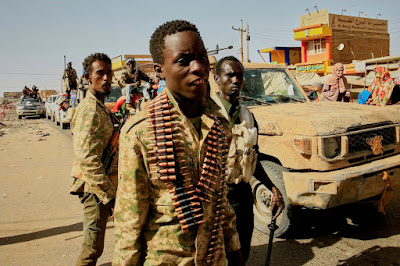INTERNATIONAL NGOs working in Sudan issued an urgent statement this week declaring that "sustained attacks, obstruction of aid and targeting of critical infrastructure demonstrate a deliberate strategy to break the civilian population through hunger, fear, and exhaustion".
They said that "anecdotal reports of recent food hoarding for military use add to the suffering of civilians". Read more in the following report.
From BBC News
By Barbara Plett Usher
Africa correspondent, BBC News
Dated Wednesday, 13 August 2025 - full copy:
'Our children are dying' - rare footage shows plight of civilians in besieged Sudan city
01:23
Media caption,
WATCH: BBC obtains rare video from inside besieged el-Fasher in Sudan
The women at the community kitchen in the besieged Sudanese city of el-Fasher are sitting in huddles of desperation.
"Our children are dying before our eyes," one of them tells the BBC.
"We don't know what to do. They are innocent. They have nothing to do with the army or [its paramilitary rival] the Rapid Support Forces. Our suffering is worse than what you can imagine."
Food is so scarce in el-Fasher that prices have soared to the point where money that used to cover a week's worth of meals can now buy only one. International aid organisations have condemned the "calculated use of starvation as a weapon of war".
The BBC has obtained rare footage of people still trapped in the city, sent to us by a local activist and filmed by a freelance cameraman.
The Sudanese army has been battling the Rapid Support Forces (RSF) for more than two years after their commanders jointly staged a coup, and then fell out.
El-Fasher, in the western Darfur region, is one of the most brutal frontlines in the conflict.
.jpeg)
Image caption, This may be the only meal these children get for a day
The hunger crisis is compounded by a surge of cholera sweeping through the squalid camps of those displaced by the fighting, which escalated this week into one of the most intense RSF attacks on the city yet.
The paramilitaries tightened their 14-month blockade after losing control of the capital Khartoum earlier this year, and stepped up their battle for el-Fasher, the last foothold of the armed forces in Darfur.
In the north and centre of the country where the army has wrestled back territory from the RSF, food and medical aid have begun to make a dent in civilian suffering.
But the situation is desperate in the conflict zones of western and southern Sudan.
At the Matbakh-al-Khair communal kitchen in el-Fasher late last month, volunteers turned ambaz into a porridge. This is the residue of peanuts after the oil has been extracted, normally fed to animals.
Sometimes it is possible to find sorghum or millet but on the day of filming, the kitchen manager says: "There is no flour or bread."
"Now we've reached the point of eating ambaz. May God relieve us of this calamity, there's nothing left in the market to buy," he adds.
The UN has amplified its appeal for a humanitarian pause to allow food convoys into the city, with its Sudan envoy Sheldon Yett once more demanding this week that the warring sides observe their obligations under international law.
The army has given clearance for the trucks to proceed but the UN is still waiting for official word from the paramilitary group.
RSF advisers have said they believed the truce would be used to facilitate the delivery of food and ammunition to the army's "besieged militias" inside el-Fasher.
They have also claimed the paramilitary group and its allies were setting up "safe routes" for civilians to leave the city.
Local responders in el-Fasher can receive some emergency cash via a digital banking system, but it does not go very far.
"The prices in the markets have exploded," says Mathilde Vu, advocacy manager for the Norwegian Refugee Council.
"Today, $5,000 [£3,680] covers one meal for 1,500 people in a single day. Three months ago, the same amount could feed them for an entire week."
Doctors say people are dying of malnutrition. It is impossible to know how many - one report quoting a regional health official put the number at more than 60 last week.
.jpeg)
BBC "The situation, it is so miserable, it is so catastrophic" -Ibrahim Abdullah Khater, Paediatrician
Hospitals cannot cope. Few are still operating. They have been damaged by shelling and are short of medical supplies to help both the starving, and those injured in the continual bombardment.
"We have many malnourished children admitted in hospital but unfortunately there is no single sachet of [therapeutic food]," says Dr Ibrahim Abdullah Khater, a paediatrician at the Al Saudi Hospital, noting that the five severely malnourished children currently in the ward also have medical complications.
"They are just waiting for their death," he says.
When hunger crises hit, those who usually die first are the most vulnerable, the least healthy or those suffering from pre-existing conditions.
"The situation, it is so miserable, it is so catastrophic," the doctor tells us in a voice message.
"The children of el-Fasher are dying on a daily basis due to lack of food, lack of medicine. Unfortunately, the international community is just watching."
International non-governmental organisations working in Sudan issued an urgent statement, external this week declaring that "sustained attacks, obstruction of aid and targeting of critical infrastructure demonstrate a deliberate strategy to break the civilian population through hunger, fear, and exhaustion".
They said that "anecdotal reports of recent food hoarding for military use add to the suffering of civilians".
"There is no safe passage out of the city, with roads blocked and those attempting to flee facing attacks, taxation at checkpoints, community-based discrimination and death," the organisations said.
Hundreds of thousands of people did flee in recent months, many from the Zamzam displaced persons camp at the edge of el-Fasher, seized by the RSF in April.
They arrive in Tawila, a town 60km (37 miles) west of the city, weak and dehydrated, with accounts of violence and extortion along the road from RSF-allied groups.
Life is safer in the crowded camps, but they are stalked by disease - most deadly of all: cholera.
It is caused by polluted water and has killed hundreds in Sudan, triggered by the destruction of water infrastructure and lack of food and medical care, and made worse by flooding due to the rainy season.
.jpeg)
Image caption, Makeshift centres have been built to treat patients who have cholera
Unlike el-Fasher, in Tawila aid workers at least have access, but their supplies are limited, says John Joseph Ocheibi, the on-site project coordinator for a group called The Alliance for International Medical Action.
"We have shortages in terms of [washing facilities], in terms of medical supplies, to be able to deal with this situation," he tells the BBC. "We are mobilizing resources to see how best we can be able to respond."
Sylvain Penicaud of Médecins Sans Frontières (MSF) estimates there are only three litres of water per person per day in the camps, which, he says, is "way below the basic need, and forces people to get water from contaminated sources".
Zubaida Ismail Ishaq is lying in the tent clinic. She is seven months pregnant, gaunt and exhausted. Her story is a tale of trauma told by many.
She tells us she used to trade when she had a little money, before fleeing el-Fasher.
Her husband was captured by armed men on the road to Tawila. Her daughter has a head injury.
Zubaida and her mother came down with cholera shortly after arriving in the camp.
"We drink water without boiling it," she says. "We have no-one to get us water. Since coming here, I have nothing left."
Back in el-Fasher we hear appeals for help from the women clustered at the soup kitchen - any kind of help.
"We're exhausted. We want this siege lifted," says Faiza Abkar Mohammed. "Even if they airdrop food, airdrop anything - we're completely exhausted."
.jpeg)
Sudan war: A simple guide to what is happening
You may also be interested in:
'I lost a baby and then rescued a child dodging air strikes in Sudan's civil war'
Oil-rich Sudanese region becomes new focus of war between army and rival forces
Sudan in danger of self-destructing as conflict and famine reign
View original: https://www.bbc.co.uk/news/articles/czxp0qyn6dqo
End


.jpeg)
.jpeg)
.jpeg)
.jpeg)
.jpeg)



